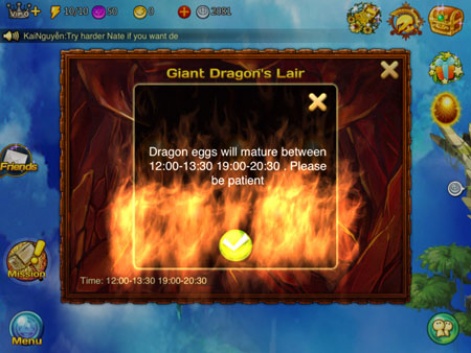It's been almost 12 months since I stunned the world into boredom and general disinterest with my original Monetizer talk.
Delivered at the Evolve day of the Develop in Brighton 2013 conference in the UK, I thought I was onto a winner when I was drawing up my slides on the 4 hour train journey down.
Although my resolve started to waver when delivering a practise version of the talk to a colleague the night before. Then, halfway through the talk, I realised no one in the audience had a clue what I was on about; something underlined by the first audience question: "So what did that mean?"
I've been throwing darts at a photo of Jason Avent's face every day since.
Onward Christian soldiers...
But, despite a reaction akind [sic] to Stravinsky's The Rites of Spring, I've persevered.
That's resulted in the analysis of 35 games - you can check out the videos here - not to mention the creation and destruction of several open source metrics for analysing and comparing F2P mobile games.
Interestingly, my original Monetizer metric - which considered the pricing structure of IAP economies and the initial 10 minute experience in a game - hasn't lasted.
But part of it - the IAP pricing structure - has matured into a series of metrics that I use to look at how developers try to retail their IAPs, as well as more abstract measures such as the Average Price of an IAP, and the number and spread of IAP prices.
Other data points I've collected - now on over 200 games - include the Discounted Currency ratio, the Unit Currency Conversion range, not to mention Popularity and Success ratios and analysis of percentage fill IAP economies.
All very Professor Jordan, I'm sure you'll agree, but perhaps not very useful for your day-to-day existence.
Which brings us to today's topic of conversation.
Following on from a talk given at GMIC Beijing, where I squashed '10 F2P Monetisation Techniques You Should Use To Supercharge Your Games' into 10 minutes...
...in Helsinki I'm planning to give you over 100 percent extra with 23 'F2P Monetisation Techniques You Should Use To Supercharge Your Games' - all within 15 minutes.
I'm calling it 'How many top F2P monetisation tricks can you fit into a 15 minute talk?'
1. It's not about revenge?
Revenge is a powerful emotion - once. The 99th time our base is trashed, we don't care. I
f you want a player to care about revenge - which is an emotional response to something that they own (which has value to them) being destroyed - then you have to make that thing actually have value.
If my trashed base immediately pop back into life, I don't care that it was trashed. If, however, it take 30 seconds to pop back into life, I do care. I might care so much I uninstall your game. I might care so much I buy a shield.
And if you let the enemy desecrate my prized possessions, I'm going to get really mad, and track them down and kill them. That's a really powerful - and dangerous - emotion.
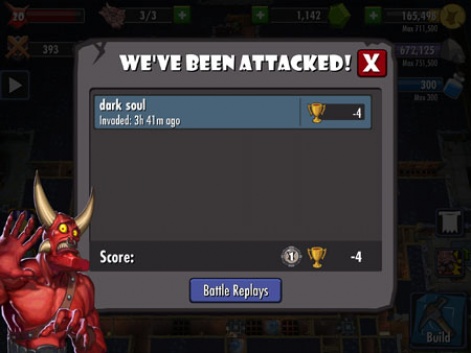
2. Permadeath, graffiti or scars?
Following on from point #1, allowing the game or someone else to permanent change things in my game state or base is a rarely used tool in current F2P mobile gaming because a casual or midcore audience can't stomach it.
But permanent damage doesn't necessarily have to be serious, significant or even nefarious. What about graffiti? Or planting trees? Or scars? Chicks dig scars.

3. Troops should not be disposable
What's the big change from Clash of Clans to Boom Beach? There are plenty but one is that you keep the troops that survive the battle. This is nice because you don't have to rebuild, but for some reason Supercell hasn't taken this concept to its logical end point and enabled you to level up individual surviving troops throughout the game.
Not only does that make surviving troops more valuable in-game, you also have more emotional attachment to them, which is a valuable hook in terms of offering options such as revives or customisation.
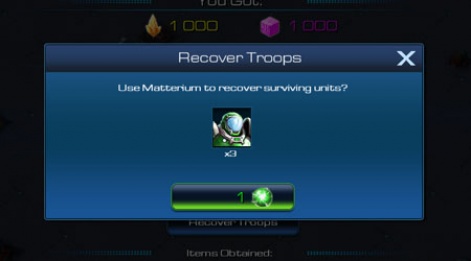
4. We don't need another hero
The logical conclusion of point #3 is the hero character, which has been a big trend over the past 12 months. Just search for the term 'Hero' in any app store.
But to be a proper hero, the character can't be generic, must be highly customisable - at least visually - and I must go through experiences that deepen my involvement and love for this character.
Question: if your game has hero characters, can I buy a 3D model of them? If not, your hero characters are likely not heroic enough.
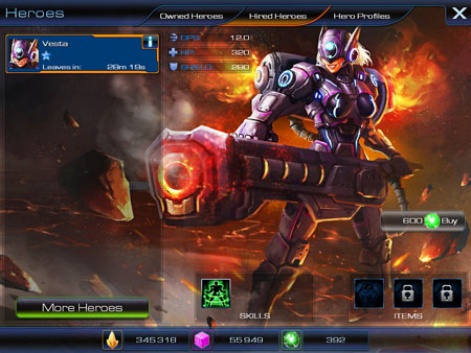
5. Clans are crap. Tribes are toss, and Alliances are awful
For games such as Clans of Clans, Game of War or Kingdoms of Camelot, the most engaged and valuable players are part of a clan.
But for the vast majority of players, such organisations are pure crap. They're full of teenage idiots, who will kick us out for the smallest mistake, and that's even if we get around to randomly choosing a group in the first place.
But it doesn't have to be like that. Social engagement is a massively powerful mechanic, especially if it's leveraged on shared experiences. That could be anything from real world friends to a shared location, sport team or favourite colour.
The bottomline is getting players into a game group will improve retention so why not automatically drop everyone in a clan. Or incentivise players massively to join a clan, any clan. Make the experience nice for them.
Kurt Vonnegut had a brilliant idea to improve social cohesion in America. At birth, everyone would randomly be given a personal colour - one of a half a dozen. His point was that despite being totally random, over time people would say; 'Yes, I though he was a bit Red', or 'She's a classic Yellow', or 'Great, you're a Purple too. Nice to meet you'. The human brain creates patterns where there are none. Do it in your game.
And here's another thought. Why should we only be in one clan? What's wrong with multiple clans?
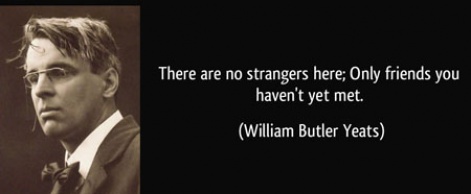
6. Friends with benefits
However you decide to structure your social game structures, let players be generous.
Gifting is a very emotional and valuable action so why not let players do more than gift low grade items? Obviously there are fraud issue with letting people gift large amounts of hard currency but there are plenty of other things people can gift - particularly given the rise of secondary currencies in F2P games.

7. Get them talking your game's social language
Lots of people don't like them but we're seeing a rise in game-specific friend referral codes.
Likely this is because social networks like Facebook. LINE, Kakao etc are becoming saturated so new, more specific channels, are opening up. Of course, to get people sharing this abstract strings of numbers and letters you need to incentivise the hell out of their use.
But when do you get players using them, you know they're committed. And you could even use friend referral codes to generate a new, better clan system (see point #5).
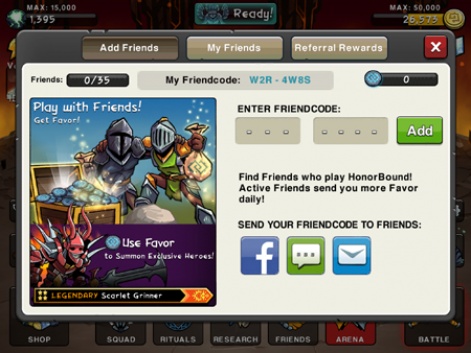
8. You are VERY important
Big in Asia, VIP status hasn't been particular popular in western games, but being told you're important is a massively powerful enhancement to our self-esteem.
Anyone who spends money in your game should be told they are a VIP, given benefits, and told how they can be more important, and gain more benefits. And this doesn't have to impact or unbalance game state. It could be purely cosmetic. Everyone like shiny armour, especially if it's only for VIPs.
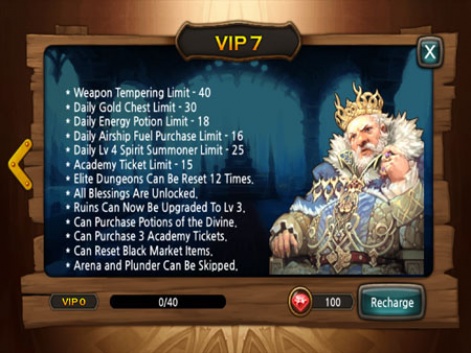
9. Subscriptions
Difficult in terms of whether app store will allow, and also problematic in terms of the fee structure, nevertheless subscriptions are an important realworld retailing option.
Perhaps game developers could think about setting up subscription services that are paid using hard or soft currency. This would work particularly well when combined with ongoing VIP services - i.e. sign up now for a 12 month VIP subscription and only pay for 6 months.
Of course, running virtual subscription - pay one upfront fee now for 6 months for all these benefits - is something that can be accomplished now.

10. The Third Builder or the Fourth Squad slot
The trend suggests builders are now old fashioned. Clash of Clans had builders. The Third Builder costs $4.99 to unlock. It was the first IAP I made and I loved it because it was a permanent unlock that increased my building efficiency by 50 percent.
It's a similar situation with squad-based RGPs, where you can open up additional slots. A good example of a flexible way to approach this is Juicebox's HonorBound, which offers a progression path or a hard currency path.
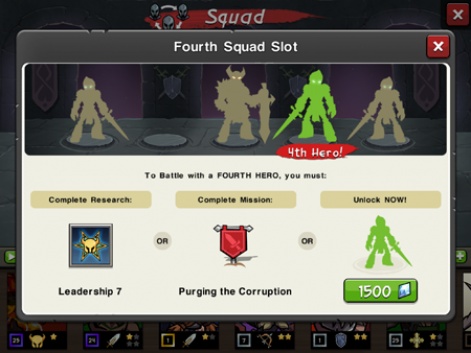
In contrast, games such as Boom Beach and Kabam's Dark District use a single build system that you have to speed up with hard currency. That's much less tactile and is part of a tendency to Nickel & Dime' our players.
But the first rule of F2P mobile games is don't Nickel & Dime your players.
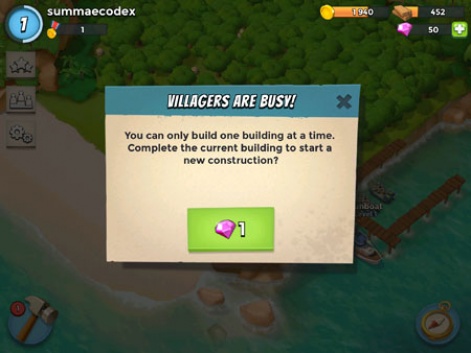
11. Boost me, baby
Don't Nickle & Dime your players. Supercharge them.
As proven by games such as Candy Crush Saga, there is a strong impulse not to lose a situation we are already engaged in. That feels like a waste.
But we can do better. A lot of games use Boosts - that is one-off consumables to improve your in-game status, typically within level-based games.
Boosts can - and should - be much more widely used, however. Linked into soft and hard currency systems, Boosts should be use to provide superhero powers for a limited time. Spending currency on boosts should be something our players love to do, because they help them win, and everyone loves to win.
In particular, developers are adopting pre-level boosts. These can be difficult to sell, however, unless the benefits you can from pre-buy these boosts is made obvious.
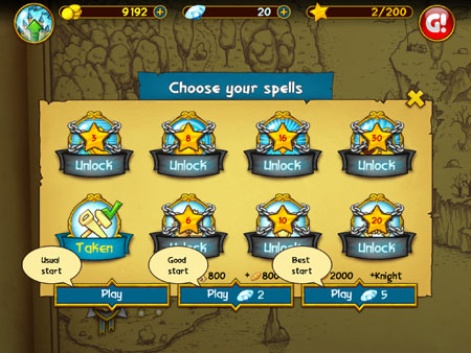
12. More, every single day
I love daily rewards, particularly when I can see there's a sequence and at the end of the week, or month, I'm going to get something great.
But maybe I'll miss a day. So how about letting me a log-in for any days I miss. Because I really want that sweet prize?
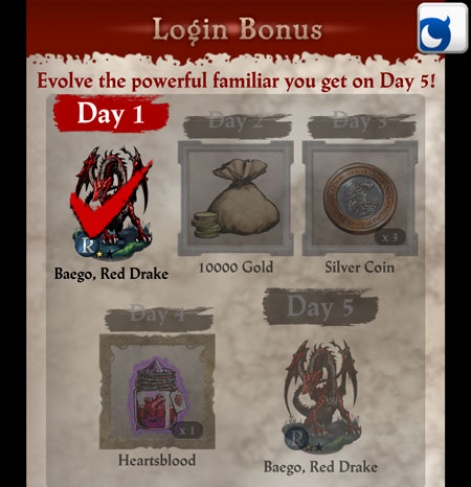
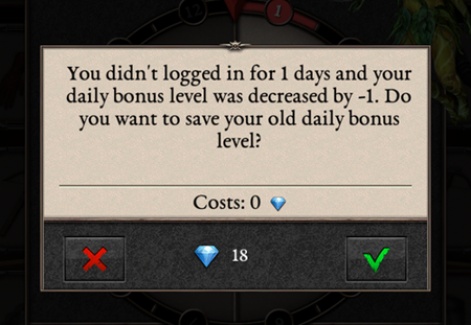
13. The power of PVP, (or should that be PVP+E?)
Player versus player activity is a very powerful driver for some players - players who enjoy dominance. But not all players enjoy dominance, that's why we're seeing PVP merging with PVE in games such as Boom Beach and Royal Revolt 2, where you attack other players purely for resources but the dominance and revenge element (see point #1) is pretty much ignored.
And remember, reversing PVP and we get gifting. And everyone love gifting (see point #6).
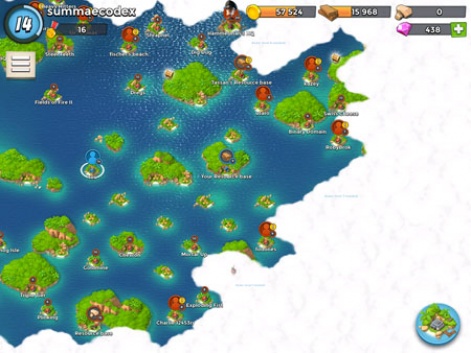
14. Reciprocity
Reciprocity - giving for influence - is probably the most important concept for any free-to-play game designer to understand.
Basically it means when people give us a small amount of something - praise, a product sample, even a free short-term rent - we have strong positive feelings toward them and their products.
In terms of F2P games, this is most simply accomplished by giving players in-game items and currency for achieving goals, such as completing tutorials.
Of course, the trick is giving them in-game currency also encourages them to spend that within the game, both increasing their progression in the game and further encouraging them to value in-game currency, and perhaps even spend real money to buy some of their own.
In many cases, however, most developers seem limited in their generosity, particularly when it comes to hard currency gifts; Supercell is a good example of a generous vendor.
Still, developers worried about unbalancing their game economy should consider lending players powerful in-game items for a short period of time. This generate reciprocal feelings while also providing a strong upsell path once the lend period is over.
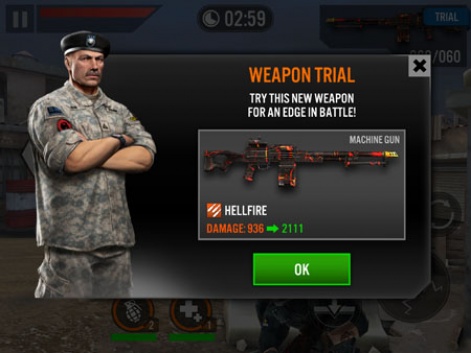
15. Spin the Wheel
Randomness is a powerful psychology force, particularly when it's associated with strong rewards.
The most obvious example of this is the gambling industry, which relies on such drives in terms of the 52 possibilities of the card deck, or the 37 or 38 slots of the roulette wheel.
In terms of mobile games, the best exponents have been Japanese developers with their Gacha random system, typically used in card collection games. So successful, it's had government restrictions imposed on it.
You don't have to play it so hardball, however. A bit of randomness linked to rewards can be simply integrated into many games using a spin the wheel or one-arm bandit mechanic, or something similar that fits your game's context. You'll want to think carefully about whether to allow players to use hard currency, though.
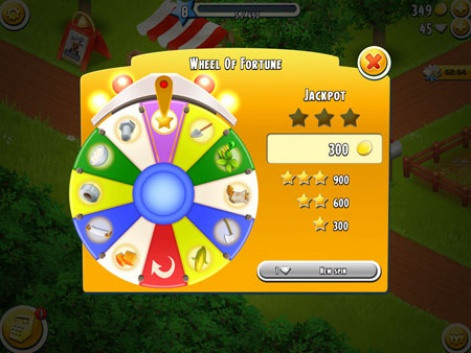
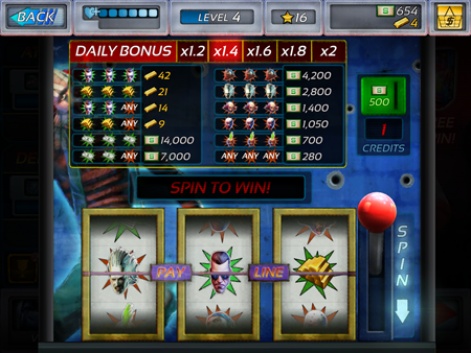
16. Resurrection
By definition any decent game is going to engage the player in sub-optimum end conditions, aha Game Over. However, such is the structure of F2P games, which typically load any in-game progression with rewards, it's perfectly reasonable to ask the player whether they want to continue to play, at some sort of resource.
The trick in these situations is, however, to offer a meaningful deal. Few people will want to resurrect at 25 percent health. Resurrection is a powerful action. It should be all or nothing.
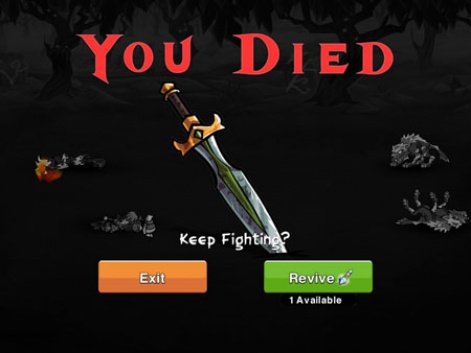
17. Inflationary pressures
Inflation is a well-known and much feared real-world economic pressure. Over time, prices rise, which then puts upward pressure on wages.
This sort of thing is yet to impact mobile F2P games, although it does trouble longterm MMOGs, which have to introduce high priced rare items to soak up users' increasing cash piles.
Yet designers can cleverly introduce inflation into mobile games too, as demonstrated by flaregames' Royal Revolt 2, which charges more each time you perform some repeated events, such as ruin clearance.
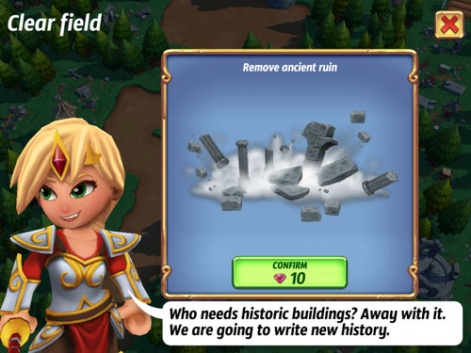
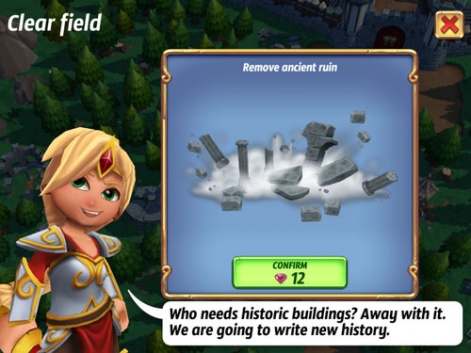
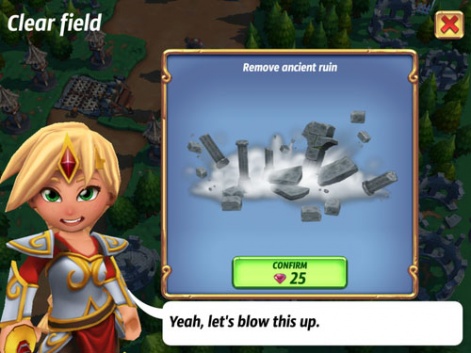
18. The time is now... or later
By their very nature, games are abstract and virtual, so anything you can do to make them more immediate and real is important.
Obviously, we all now know about games-as-a-service, so the news that you need to run timed events should not be a surprise.
You do need to be careful about how you run these events however as you are asking your players to stop their real-world activity for a virtual experience.
In that sense, timing need to be both anticipatory and exciting, not presented in an illogical manner or like a dentist's appointment - something Glu Mobile manages to combine in this prompt from Odyssey.
